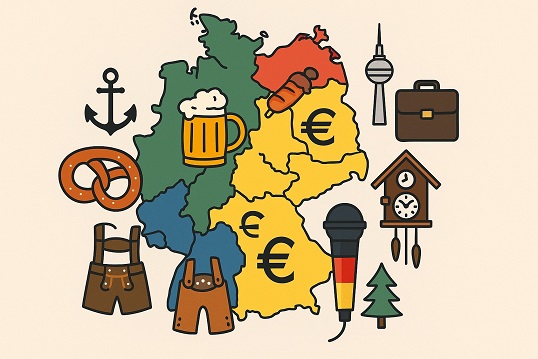
The world loves neat labels, and few are as durable as German stereotypes: humorless, hyper punctual, rule obsessed, sausage powered. The reality is more interesting. Germany is a big, varied country where regional culture, history, and everyday pragmatism complicate the clichés. In this guide we unpack the biggest German cultural myths, show where they came from, and explain how real Germans actually communicate and live.
Why German stereotypes stick – a quick origin story
Clichés travel well because they are simple. German stereotypes date back to travel writing, war propaganda, and export branding. Precision machines and punctual trains helped cement the image of a nation of engineers with stopwatches. Comedy tropes added the stern accent and lab coat. What these stories leave out are class differences, migration, regional identity, and a postwar culture built around civic responsibility more than bombast.
Humorless Germans – the myth, the reality, the punchline
German stereotypes often start with humor. The myth says Germans do not joke; the reality is that German humor tends to be dry, situational, and timing based. Wordplay thrives in compounds and idioms. Regional traditions – Cologne carnival, southern cabaret, Berlin satire – produce comedians who sell out arenas. If you come expecting slapstick, you may miss the deadpan wink. Try tuning your ear with our pieces on idioms and proverbs for the underlying rhythm of the joke.
See: The Most Bizarre German Idioms and What They Really Mean; German Proverbs.
Too direct or just clear – what German directness really is
Many visitors label Germans as blunt. In practice, clarity is a politeness strategy: say what you mean so others can plan. That does not license rudeness. Tone matters, and modal particles – doch, mal, ja, schon – soften edges in real speech. In writing, bullet points and action verbs replace flowery hedging. If you want the playbook for these nuances, pair this article with our guides to German Body Language and everyday particles.
Punctual, precise, perfectionist – useful myth or daily norm
The cliché works because it is half true. Trains aim for punctuality, factories document processes, and meetings start on time. Yet everyday life includes delays, missed connections, and cheerful improvisation at the bakery counter. What persists is the expectation of reliability – the plan should exist, even if reality nudges it. That expectation is cultural glue rather than personal virtue signaling. When things slip, Germans usually value a quick heads up more than heroic last minute fixes.
Cold and distant – body language and small talk decoded
Another of the durable German cultural myths is the chilly greeting. In formal settings, posture is tidy, handshakes brief, smiles small. That reads as cool to visitors from high small talk cultures. Move the context – private gatherings, clubs, village festivals – and warmth rises fast. Friendship here is often earned rather than assumed, but once you are in, you are really in. Learn the nonverbal defaults and you will read the room correctly.
The language sounds harsh – accent, rhythm, and why ears disagree
People abroad sometimes call German harsh because they hear crisp consonants and the ach sound [x]. But regional German can be lilting and soft – Bavarian and Rhineland speech are musical, Swabian is rounded, Low German is sea breezy. When Germans speak foreign languages, transfer effects create the recognizable German accent: firm consonants, clear vowels, front loaded stress. Shaping rhythm and a few consonants transforms how it is perceived without erasing identity.
One Germany – many voices: dialects, regions, and class
The myth of uniformity hides a patchwork. North – South, East – West differences are audible in greetings, humor, and pace. Even within cities, class and migration histories shape style. Cologne’s warm banter is not Munich’s calm reserve. Berlin’s brusque charm is not Freiburg’s mellow cadence. Hearing German stereotypes dissolve in real life is often a matter of two train stops and a different bakery.
Work robots – the Protestant work ethic misunderstood
The stereotype says Germans live to work. The lived reality balances duty with Feierabend and generous leave. The cultural script values preparation, training, and quality – not burnout. That script grew from a long story of vocation, crafts, and codified worker voice. Younger Germans keep the quality bar while pushing for flexibility and purpose.
See: The Protestant Work Ethic in German Culture.
Food, beer, and lederhosen – what is actually typical
Yes, you will find beer gardens and sausages. You will also find Syrian street food in Frankfurt, Vietnamese bakeries in Berlin, Swabian pasta in Hamburg, and world class vegetarian menus in Munich. Regional breads and cakes inspire loyal followings – Semmel in the south, Weck in the southwest, Rundstück in the north. Traditional dress shows up at festivals and tourism spots more than in offices. Everyday Germany is global, seasonal, and fiercely local about good bread.
Stereotypes abroad – how Germans tailor their style
When Germans work or study abroad, they often adapt rather than abandon. English emails get warmer openings and softer closings. Presentations add signposting and story. In Romance contexts, melody and gesture rise a notch. None of this contradicts the home style; it is audience design. Successful communicators switch codes without losing themselves.
FAQ – quick answers about German cultural myths
Are Germans really always on time?
Many try to be. The cultural norm values reliability. If you will be late, a short message is the polite move.
Why do Germans sound blunt in English?
They transfer home norms for clarity. Add a few softening phrases – could we, I wonder if – and the effect changes instantly.
Do Germans dislike small talk?
They prefer purposeful small talk. Weather and weekend plans are fine, but logistics come fast. In private settings, conversation can be expansive and personal.
Is the German accent avoidable?
You can lighten it. Focus on w vs v, th sounds, and English stress. Keep clarity – it is an asset in global settings.
Are lederhosen and Dirndl everyday clothing?
Mostly festival wear in Bavaria and Austria. Daily dress is like anywhere in Europe: practical, seasonal, and city specific.
Related articles:
- Understanding the German Language: From Slang to Sütterlin
- German Body Language
- Regional Dialects in Germany
- The German Accent Abroad
- German Swear Words and Their Surprisingly Creative Origins
- Why German Compound Words Are So Long
- The Most Bizarre German Idioms and What They Really Mean
- The Protestant Work Ethic in German Culture







